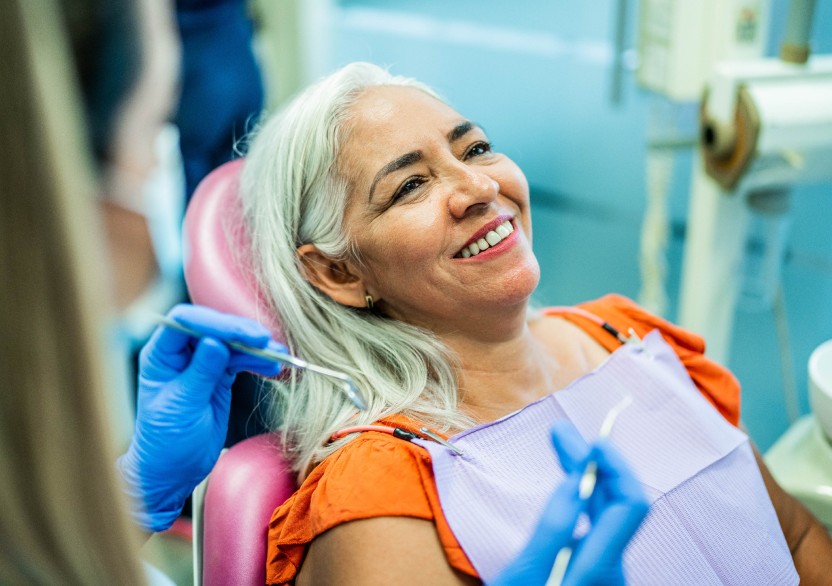Unveiling the hidden impact of menopause: Have you talked to your dentist about menopause?

What do dry mouth, receding gums, altered taste, and tooth decay all share? These are oral health symptoms that can plague women at menopause. While hot flashes and mood swings typically take center stage during menopause, the natural phase of a woman’s life over 50, many women don’t realize there is a connection between menopause and their oral health. As women navigate their hormonal journey, understanding this less-discussed connection can be an essential component to maintaining a vibrant smile and healthy teeth.
Delta Dental’s survey “Breaking the Stigma: Let's Talk About Menopause and Oral Health” found that 70 percent of women 50 and over experienced many oral health symptoms that they had no idea were related to the hormonal changes of menopause. More concerning, 84 percent of women shared they weren’t aware of the potential impact of menopause on their oral health. “Despite the knowledge gaps revealed in the survey, sentiments about menopause are beginning to shift, and women are eager to break the stigma,” says Sarah Chavarria, President of Delta Dental.
Chavarria says Delta Dental is committed to empowering more whole-person care that incorporates oral health into overall well-being, including in menopause. “Being more open will help make treatment plans more accessible for all people who experience menopause.”
What is the connection between menopause and oral health?
Despite experiencing oral health-related symptoms such as increased tooth decay, bleeding gums, reduced saliva, and burning tongue, among others, women typically don’t connect these dental dots to menopause. Remarkably, 90 percent of women in the survey didn’t realize, for instance, that reduced saliva production was a menopausal symptom or that increased tooth decay and gum disease, jawbone density, tooth loss, and receding gums had anything to do with menopause or hormones.
Even the appearance of your teeth and smile can be affected. Among women surveyed, 79 percent said they’d noticed a change in the appearance of their smile as they age.
Despite these knowledge gaps, half the women expressed interest in learning more about how hormonal changes affect their oral health as they age, the health and lifestyle changes they can make to help improve their risk for oral health problems, and how to prevent or minimize menopause from impairing their overall oral health.
- 77% said they would prioritize their next dental exam/cleaning
- 43% said they would devote more time to their oral care routine
Why should you be talking to your dentist about menopause?
Maintaining optimal oral health is a lifelong priority, but women experiencing menopause need to be aware of how this life stage can impact their oral health and needs.
“What’s most compelling to me is how few menopausal women said they had asked any physician about oral health symptoms,” shares Karen Horace, DDS, Dental Policy Manager at Delta Dental. “That’s a care gap with extensive repercussions – saliva is the natural buffer of your mouth, and less saliva means less protection against dry mouth, which is at the crux of all other oral health symptoms related to menopause, like burning tongue, increased tooth decay, and altered taste,” she says.
Dentists and dental hygienists are an untapped wealth of information when it comes to learning about the oral health problems women may face at menopause and how to navigate them. Dr. Horace encourages pre, peri, and post-menopausal women to share any oral health changes they’ve noticed with their dentist or hygienist.
Checking in with patients approaching or in menopause should be the norm. “As medical professionals, we have a responsibility to ensure our patients are receiving the holistic health care and support they deserve – not only oral health but whole person health as well,” says Daniel Croley, DDS, Chief Dental Officer at Delta Dental. “We can help ease the burden and break the stigma by creating space for these conversations.”
What can you do to protect your oral health during menopause?
There are a number of ways to protect your oral health during menopause, including:
- Maintain good oral hygiene by following the rule of 2-1-2: Brush twice a day, floss once a day and visit your dentist twice a year.
- Stay hydrated by drinking enough water throughout the day and talk to your doctor if you experience dry mouth.
- Eat a balanced diet rich in vitamins and minerals, especially vitamin D and calcium, which support strong teeth and bones. Limit sugary and acidic foods that can contribute to tooth decay.
- Pay attention to bone health, as it can also affect jawbone density.
- Exercise regularly to support overall and heart health, which are also linked to oral health.
- Talk to your dentist about menopausal oral health concerns for personalized information and recommendations.
By taking care of your oral health during menopause, you can keep your smile healthy and bright for many years to come. You can find more resources on how to take better care of your oral health in Delta Dental’s Healthy Aging Wellness Library.